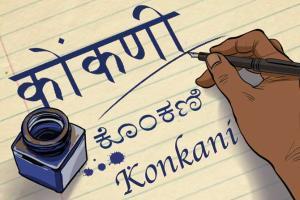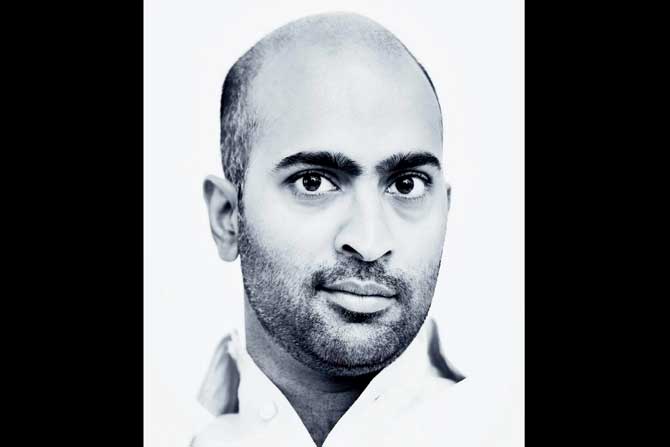A new book explores how Goas recognition of the Devanagari script for Konkani has excluded the average Goan Catholic, who experiences the language differently

Illustration /Uday Mohite
LONG after the Portuguese left Goa in 1961, the erstwhile colonisers were still in vogue in the coastal belt. Cars and three-wheelers displaying Portuguese flags, national colours and emblems would amble down the quaint gullies and streets, as if India was not mothership yet. Jason Keith Fernandes, who was pursuing his doctoral research then, remembers being intrigued by this practice, common among the working-class and lower middle-class Goan Catholics. This, he'd learn, was not just their attempt to demonstrate claim to Portuguese citizenship, but also distinguish themselves from the rest of the population in the state.
At the time, Fernandes was keen on researching the "multi-sited ethnography of the citizenship practices of Goan Catholics" in Goa, Portugal and London. "I came to language politics almost by accident," says Fernandes, who is currently a researcher at the Centre for Research in Anthropology, University Institute of Lisbon, Portugal.
His new book, Citizenship In A Caste Policy (Orient BlackSwan), explores the complex history of caste and class, behind the recognition of Konkani as Goa's official language, and how by deliberately excluding the Roman script, the largely lower-caste and lower-class Catholics were denoted as less authentic members of society. At present, Devanagari or Nagari is considered the official script for Konkani in Goa, invalidating any other script, including Roman. The argument among the pro-Nagari activists is that Konkani is an Aryan language, and therefore, its script must also be Aryan. "While Konkani is clearly marked by Indo-European features, there is a failure to realise that language and script are not necessarily related, and are in a sense arbitrarily assigned to each other. Thus, an Indo-European [language] need not necessarily have an 'Aryan' script. But the real question is, why are we troubled by the fact that proto-Konkani (i.e. the language form before it was standardised by missionary activity) was written in Halle-Kannada? The discomfort stems from the racism that underlies the Konkani project. It stems from a desire to be classified, in colonial times, as 'civilised Aryans' and more recently as part of the largely northern Indian project of Indian nationalism."

Jason Keith Fernandes
He also counters historian-linguist José Pereira's assertion that there existed a distinct Goan region, and a standard form of Konkani, before the Portuguese and the missionaries arrived. "This is highly unlikely because, as is well known, caste, which is such a strong factor now, and was earlier as well, strongly determines the kind of language that you speak. There is, as a result, no possibility of a standard form language. Language is also marked by region. This was the case in Europe, and is the case here too, as we can see with Konkani, where it differs in Pernem, from that in Bardez, and that in Salcette, Karwar, and Mangalore. This is to say that each of these regions had distinct identities in the past, and many came together only as a result of the Portuguese knitting them together into a province of the Estado da Índia."
The Konkani Project in Goa has witnessed several roadblocks over the last two centuries. In Portuguese-Goa, the resistance first came from those using the Marathi language. "This included essentially dominant castes for whom Marathi was both a route for employment in British India, as well as increasingly a way to distinguish themselves from polluted Christians who spoke Konkani. Marathi would later be embraced by the Bahujan Hindus because of the way it was entwined with Hindu and Indian nationalism, at a point when they were embracing both, to pull themselves out of the abject condition they were in." After Konkani was adopted by Goans, attempts were made to determine its historical authenticity based on the script. It affected the way the language was experienced by the average Goan. "To begin with, there has been, or was, until they began to push back, an attempt to suffocate production in the Roman script. This involved denying awards and state support to literary work being produced in Roman, i.e. forcing them to produce in Nagari Konkani."
But this is only at the material level, says Fernandes. "Perhaps the more brutal impact has been at the emotional level. One of the things I did not expect my work to develop into was an examination of the emotions of citizenship. I had initially decided to focus on practices of citizenship. It was only when I was in the field and hanging out with Roman script activists that I realised that there was a deep sense of being shamed among them. There was also the sense of being excluded from the national (Indian), and removed from the sub-national (Goan) community, to which they wanted to belong, and into which they wanted to return. They were ashamed that the fruit of their literary and cultural labour was held to not have standard. And that their cultural lives were simply not Indian enough." These concerns have become ever more valid today, "especially since belonging to the Indian nation is increasingly being marked on Hindu lines". "To be Hindu, according to this understanding, is to hold a place in the top varna categories. As such, at least for the small number of pro-Nagari Catholic elites, Sanskritised Konkani in the Nagari script, is, consciously or unconsciously, about asserting caste, their link to Hindu India, and more importantly, crafting a place at the high table of power."
The language mobilisation, he feels then, has done little to unify this community of Konkani speakers. "But I would point out that there was no community to begin with. What we have in India, and a number of Ambedkarites would agree with me, is not a society, but a collection of castes working parallelly."
Keep scrolling to read more news
Catch up on all the latest Mumbai news, crime news, current affairs, and a complete guide from food to things to do and events across Mumbai. Also download the new mid-day Android and iOS apps to get latest updates.
Mid-Day is now on Telegram. Click here to join our channel (@middayinfomedialtd) and stay updated with the latest news
 Subscribe today by clicking the link and stay updated with the latest news!" Click here!
Subscribe today by clicking the link and stay updated with the latest news!" Click here!









